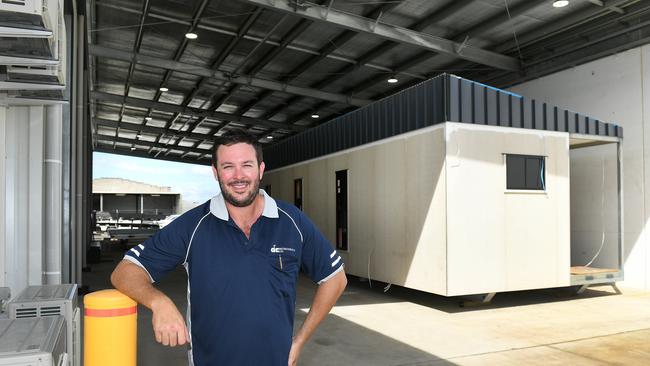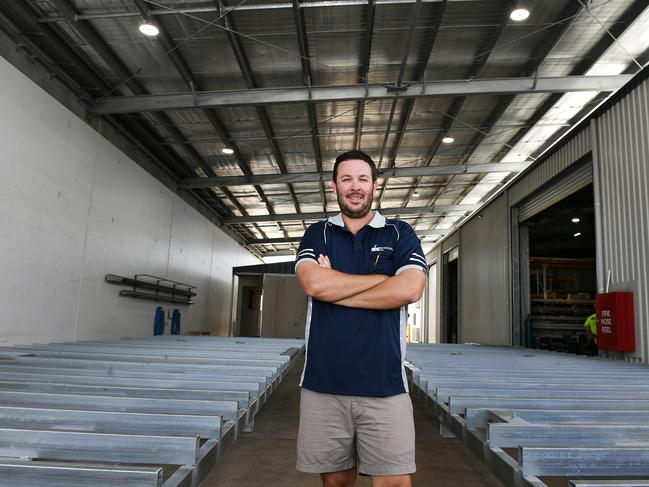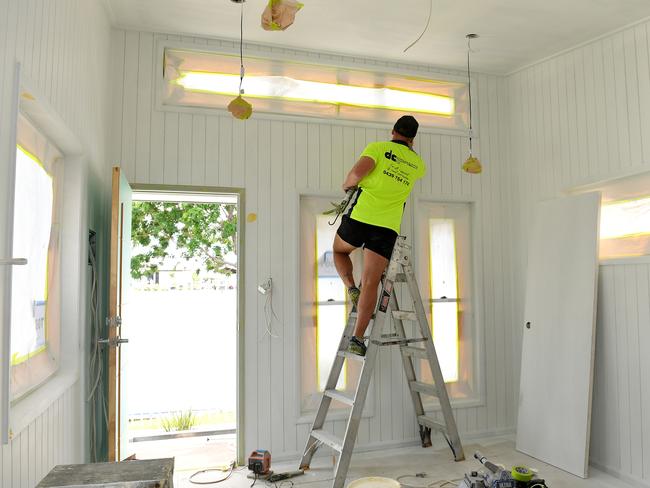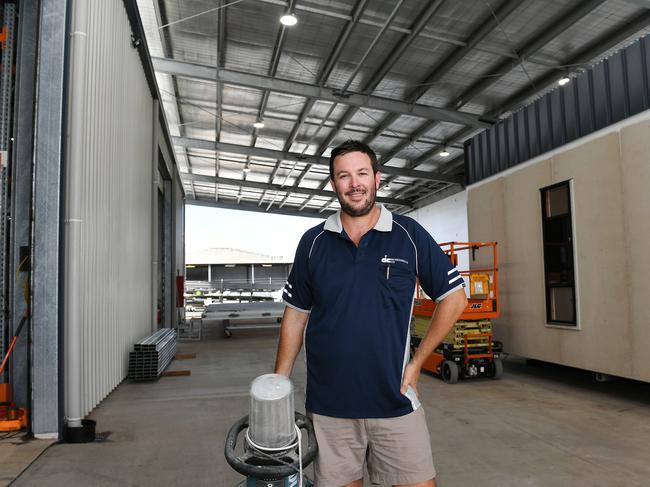Trailblazers DC Constructions NQ lead the way with alternative construction approach
A Townsville business is hoping to boost NQ’s housing supply in a unique way. Read how the DC Constructions is developing transportable homes.

News
Don't miss out on the headlines from News. Followed categories will be added to My News.
A company embracing alternative methods of construction is helping put a roof over peoples’ heads faster amid a huge demand for housing in North Queensland.
Family-owned DC Constructions NQ is spearheading prefab and modular building in the region, and challenging misconceptions about the industry.
Prefab and modular building involves constructing parts or entire structures off-site, typically in a factory, with components ranging from walls and beams to entire buildings then transported to the construction site.
Located at 470 Woolcock St, Garbutt, DC Constructions NQ, which was founded in 2014, specialises in the design, construction, and installation of transportable buildings throughout Queensland.
They include modular one to four bedroom homes, granny flats, cabins, studios, commercial offices, and amenities that were engineer certified, cyclone rated, and council approved.
DC Constructions NQ director Daniel Cameron said they were the only businesses in the region producing high-end modular buildings, with their nearest comparative competitors located in south east Queensland.

“There’s a bit of a preconceived idea locally that modular construction is more of a “donga” or low-end housing option, when it’s basically on par with your typical on-site build when it comes to materials, finishes and everything else,” Mr Cameron said.
“It is like building your typical Queenslander style home that is raised off the ground on stumps except it is built in a workshop and then transported to site.”
In their workshop environment, he said they supervised and scheduled jobs very effectively, and rain or weather days were not something to worry about, other than the one week for installation.
“Building in this environment we can typically shave several weeks or even months off build time frames compared to onsite builds,” he said.

“Modular homes will not replace your conventional slab on ground build however they do have their place alongside these builds to provide additional housing quicker, and there are certain sites where modular may be a better option, like on sloping or hill sites.”
He said modular options were cost effective for more remote and rural areas where travel, accommodation and time on site to build traditionally was not practical and could be costly.
“A recent home we completed on a western Queensland cattle station came in approximately 40-45 per cent cheaper than multiple other quotes the owners advised us,” Mr Cameron said.
Their 10 staff were currently constructing up to three builds at a time on their Garbutt workshop’s production line, creating between 16-20 structures per year.

Determined to triple their staffing and output, the business has purchased a block at Commercial Ave, Bohle, to construct a larger facility featuring overhead cranes and streamlined production bays – helping to increase productivity and shorten build times.
They planned to gradually transition between the facilities over the next 18 months.
“Locally in Townsville in new subdivisions, houses raised off the ground don’t fit the criteria for the covenants and can’t be constructed,” Mr Cameron said.
“Skirting boards can be installed to hide the stumps and underside of the house making them look quite aesthetically pleasing.

“I feel with the housing crisis there could be a new subdivision or two that caters more for modular builds, this would certainly increase the number of houses that could be built across both sectors for the year.”
He called for increased local government support to promote and support modular housing, and for QBuild’s Modern Methods of Construction (MMC) program to have a greater presence in NQ.
Stakeholders back the modular approach
Master Builders NQ regional manager Mark Vaughan didn’t think there was a single solution or silver bullet to solve the housing crisis, but with industry a long way short of meeting the demand for new construction, all options needed to be on the table.
“Government and industry alike are increasingly turning to MMC as the solution … to boost productivity … increase the supply of housing and community buildings, but also with the promise to improve quality and safety in construction,” Mr Vaughan said.
“MMC must be part of the conversation. It can help manage risks like severe weather, boost waste management, and support environmental goals like achieving net carbon targets. It can help address some of the labour supply problem, attracting new people to our industry and getting more done with less. Looking ahead, it could even help cut costs and reduce build times.”
In the future, he said MMC could feature new materials like “kits of parts” and advanced technology like 3D printing and AI.
He said more government support was needed to encourage wider uptake of modular construction, with QBuild’s MMC program a step in the right direction towards streamlining the design and delivery of modular housing.
“(There needs to be) enough certainty in the pipeline of demand to support the investment in manufacturing facilities, matching traditional financing and payment schedules with off-site programs, and the risk to builders in handing over significant project stages to an off-site subcontractor,” he said.
“We’re calling on the state government to continue this leadership role and continue its work to help build a pipeline of demand and to work with us to show the barriers can be overcome.”
Queensland Executive Director of the Property Council Jess Caire said the modular and prefabricated housing sectors in Queensland were in their nascency and required further government investment to fully leverage the benefits.

“Overseas these sectors are more mature and offer a range of benefits in terms of streamlining construction costs and time frames,” Ms Caire said.
“Programs such as the state government’s Modern Methods of Construction program are an excellent start and should be built upon.”
A Townsville City Council spokesman confirmed that its approval time frames for modular housing were the same as detached housing.
“The intended construction technique is not considered as part of council’s development assessment process,” he said.
It is understood that there were challenges around the building certification process for modular homes where private building certifiers assess plans against the National Construction Code (NCC).
Given that there were different assessments in different states, there were additional challenges getting your modular home constructed outside of Queensland.
For more information, visit: dcconstructionsnq.com.au.
More Coverage
Originally published as Trailblazers DC Constructions NQ lead the way with alternative construction approach





